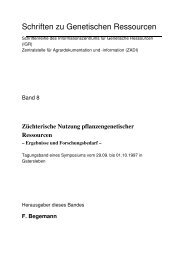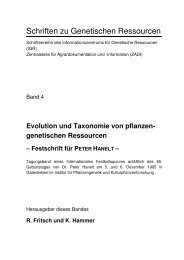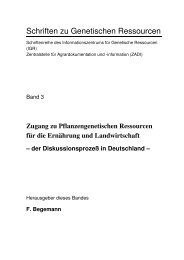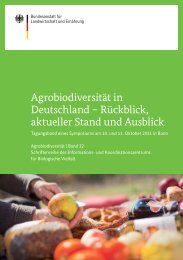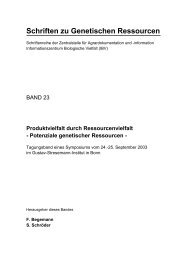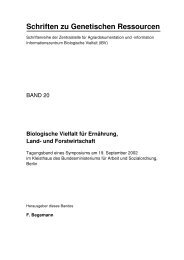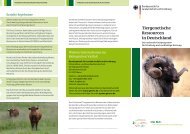Integration of Conservation Strategies of Plant Genetic ... - Genres
Integration of Conservation Strategies of Plant Genetic ... - Genres
Integration of Conservation Strategies of Plant Genetic ... - Genres
Create successful ePaper yourself
Turn your PDF publications into a flip-book with our unique Google optimized e-Paper software.
Conclusion<br />
Obviously, co-operation can take many forms, but two factors will be paramount. First is the<br />
development <strong>of</strong> trust; no progress will be made if either sector regards the other as in any way<br />
inferior. The key distinction is not between informal and formal, or in-situ and ex-situ, but<br />
between final users; big pr<strong>of</strong>essionals -- whether growers or breeders -- need access to plant<br />
genetic resources just as surely as amateurs. It happens that gene banks, with their emphasis on<br />
long-term storage in the absence <strong>of</strong> selection, are better suited to supply pr<strong>of</strong>essional breeding<br />
programmes, while seed savers, with their emphasis on conservation through utilisation, are better<br />
suited to supply growers. But both sectors are absolutely essential to the preservation <strong>of</strong> plant<br />
genetic resources.<br />
Second is the question <strong>of</strong> financial support. With very few exceptions, the informal sector is<br />
involved in a constant struggle for its own survival. Long-term funding for curatorial<br />
conservation is just as hard, if not harder, to find outside national programmes as inside them.<br />
A little <strong>of</strong>ficial recognition <strong>of</strong> the true value <strong>of</strong> crop biodiversity -- manifested perhaps by changes<br />
in legislation and funding -- would go a long way to ensuring its continued availability.<br />
Appendix<br />
Alternative List for Amateur and Garden Supplies <strong>of</strong> Vegetable Seed:<br />
Proposal for discussion<br />
1 There is growing acceptance <strong>of</strong> the unfortunate impact on the availability <strong>of</strong> varieties to<br />
gardeners and small growers <strong>of</strong> existing crop variety registration legislation at home and<br />
in the EC.<br />
2 We therefore welcome the Anglo/French EU initiative, which seeks to open up the process<br />
<strong>of</strong> marketing certain varieties.<br />
3 The HDRA has already commented (to MAFF PVRO UK) on some aspects <strong>of</strong> the<br />
proposal, such as the arbitrary time limit and the overlarge maximum allowable seed<br />
weights. Although we have had no feedback on this, we assume that the validity <strong>of</strong> our<br />
comments has been recognised.<br />
4 The greatest outstanding problem remains that <strong>of</strong> consumer protection. Varietal identity,<br />
seed purity and seed quality all need to be controlled. In this paper I put forward the<br />
outline <strong>of</strong> a working system that is intended to save the valuable baby <strong>of</strong> quality control<br />
while throwing out the bathwater <strong>of</strong> unnecessary, costly, and burdensome regulation.<br />
5 The current system <strong>of</strong> DUS testing is too restrictive, not least because the lack <strong>of</strong><br />
uniformity in, for example, maturity dates is <strong>of</strong>ten a desirable quality. It is also, as<br />
currently operated, too expensive for the scale <strong>of</strong> enterprise envisaged. In its place, I<br />
propose a deposit system, analogous to the American Type Culture Collection (ATCC).<br />
6 This scheme could easily apply to the entire European Community, with a single<br />
designated body.<br />
7 For each variety, each person marketing seed would be required to lodge a name and<br />
description <strong>of</strong> the variety with an approved designated body.<br />
8 The person would also be required to deposit a bulk sample for storage and several<br />
aliquots for germination testing. These samples would be used only in the case <strong>of</strong> a<br />
dispute over varietal identity.<br />
81 The samples would be prepared for long-term cold storage, i.e. dry and foil packed.<br />
82 The designated body would keep the samples in cold storage.<br />
83 Germination would be tested by the designated body on a regular basis



